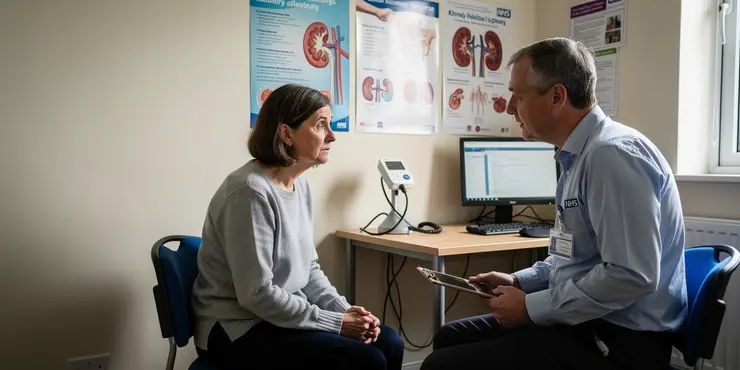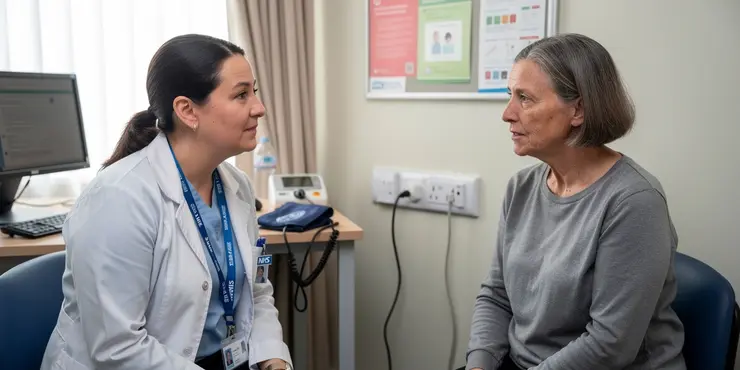
Find Help
More Items From Ergsy search
-

Who is at risk of developing chronic fatigue syndrome?
Relevance: 100%
-

Is chronic fatigue syndrome contagious?
Relevance: 99%
-

What causes chronic fatigue syndrome?
Relevance: 96%
-
What is chronic fatigue syndrome?
Relevance: 96%
-

Are there psychological aspects to chronic fatigue syndrome?
Relevance: 90%
-
Is chronic fatigue syndrome a mental illness?
Relevance: 88%
-
Can children develop chronic fatigue syndrome?
Relevance: 84%
-

What role do infections play in chronic fatigue syndrome?
Relevance: 81%
-

How is chronic fatigue syndrome treated?
Relevance: 77%
-

Is there a cure for chronic fatigue syndrome?
Relevance: 75%
-

Myalgic encephalomyelitis or chronic fatigue syndrome (ME/CFS) | NHS
Relevance: 71%
-

How is chronic fatigue syndrome diagnosed?
Relevance: 70%
-

Can chronic fatigue syndrome be managed with lifestyle changes?
Relevance: 62%
-

How does CFS differ from regular fatigue?
Relevance: 46%
-

What role do chronic conditions play in driving risks for seniors?
Relevance: 40%
-

What is Cushing's syndrome?
Relevance: 39%
-

Can fatigue result in dangerous driving?
Relevance: 37%
-

What is irritable bowel syndrome (IBS)?
Relevance: 36%
-

Carpal Tunnel Syndrome
Relevance: 36%
-

Prader-Willi Syndrome | NHS
Relevance: 35%
-

What is my risk of kidney failure with CKD (chronic kidney disease) | UHL NHS Trust
Relevance: 35%
-

What causes Carpal Tunnel Syndrome?
Relevance: 35%
-

What is Carpal Tunnel Syndrome (CTS)?
Relevance: 35%
-

Safe sleeping and reducing the risk of Sudden Infant Death Syndrome (SIDS)
Relevance: 35%
-

Can CFS be prevented?
Relevance: 34%
-

What is congenital rubella syndrome?
Relevance: 34%
-

What is post-treatment Lyme disease syndrome (PTLDS)?
Relevance: 34%
-

Munchausen's syndrome | NHS
Relevance: 33%
-

What causes chronic kidney disease?
Relevance: 33%
-
Can weight loss medications cause fatigue?
Relevance: 33%
-

Symptoms of irritable bowel syndrome (IBS)
Relevance: 33%
-

What is complex sleep apnea syndrome?
Relevance: 32%
-

Charles Bonnet Syndrome
Relevance: 32%
-
How can I prevent Carpal Tunnel Syndrome?
Relevance: 32%
-

Exercises for sciatica: piriformis syndrome | NHS
Relevance: 32%
-

Having a child with Down's syndrome | NHS
Relevance: 32%
-

About irritable bowel syndrome (IBS)
Relevance: 32%
-

Down's syndrome: Emily's story | NHS
Relevance: 31%
-

Is Carpal Tunnel Syndrome covered by the NHS?
Relevance: 31%
-

What is complex sleep apnea syndrome?
Relevance: 31%
Who is at Risk of Developing Chronic Fatigue Syndrome?
Chronic Fatigue Syndrome (CFS), also known as Myalgic Encephalomyelitis (ME), is a complex and debilitating condition characterized by extreme fatigue that cannot be explained by any underlying medical condition. Identifying who is at risk can be challenging, as the exact cause of CFS is not clear, and a variety of factors may contribute to the development of the condition. However, certain groups appear to be more susceptible than others.
Age and Gender Factors
One of the notable patterns in CFS is its prevalence in specific age groups and between genders. CFS can affect individuals of any age, but it is most commonly diagnosed in people between the ages of 20 and 40. There is also a higher incidence rate in women compared to men. This disparity suggests that hormonal factors may play a role in the development of CFS.
Genetic Predisposition
Some studies suggest that genetic factors may contribute to the risk of developing CFS. Individuals who have close relatives with CFS seem to have a higher chance of developing the syndrome themselves. This points towards potential genetic markers or hereditary factors that could increase susceptibility to CFS, although specific genes have not yet been conclusively identified.
Stress and Immune Dysfunction
Another significant risk factor is stress-related and immune system dysfunction. Many people report an onset of CFS following a period of intense physical or emotional stress, or after a viral infection, such as the Epstein-Barr virus or a severe bout of influenza. This leads researchers to believe that the immune system and stress response may be critical in the onset of CFS. Individuals with a history of frequent infections or those who experience abnormal immune responses may be at an increased risk.
Environmental and Lifestyle Factors
Environmental and lifestyle factors can also influence the risk of developing CFS. Exposure to certain environmental toxins or pollutants has been suggested as a potential risk factor. Additionally, lifestyle factors such as insufficient physical activity, poor diet, and inadequate sleep can exacerbate the body's vulnerability to chronic fatigue.
Psychological and Societal Influences
CFS is often found to correlate with mental health disorders such as depression and anxiety. While it is not a psychological condition, individuals with pre-existing mental health issues or those under significant psychological distress may experience exacerbated symptoms. Social support and economic status can also play roles; those who lack a support network may find themselves more isolated and stressed, potentially increasing the risk of developing CFS.
Understanding these risk factors is crucial for early identification and management of CFS. It highlights the need for comprehensive healthcare approaches that consider both biological and psychosocial components in its prevention and treatment strategies.
Who is at Risk of Getting Chronic Fatigue Syndrome?
Chronic Fatigue Syndrome (CFS), also called Myalgic Encephalomyelitis (ME), makes people very tired all the time. Doctors do not know exactly what causes it, and it is hard to tell who might get it. But some people seem more likely to get CFS than others.
Age and Gender
CFS can happen to anyone, but it is usually found in people who are between 20 and 40 years old. Women are more likely to get CFS than men. This might be because hormones in the body affect CFS.
Family History
Some people in a family may have a higher chance of getting CFS if their close relatives have it. This means that CFS might run in families, but scientists have not found the exact genes that cause it yet.
Stress and Immune System Problems
People who have a lot of stress or whose immune systems do not work properly might be more at risk of getting CFS. Sometimes, people get CFS after being very stressed or sick with a virus, like the flu. This makes researchers think that how the body deals with stress and infections might be important in causing CFS.
Environment and Lifestyle
Where people live and how they live can affect their chances of getting CFS. Being around pollution or not getting enough exercise, eating unhealthy food, and not sleeping well can make people more likely to become very tired.
Mental Health and Support
CFS can be worse for people who have depression or anxiety, even though it is not just a mental health problem. People who do not have friends or family to support them, or those who are very stressed, may have a higher chance of getting CFS.
Knowing about these risk factors can help doctors find and treat CFS early. It is important to think about both the body and mind when dealing with CFS.
Frequently Asked Questions
What is chronic fatigue syndrome (CFS)?
Chronic fatigue syndrome (CFS) is a complex, long-term illness characterized by extreme fatigue that does not improve with rest and may worsen with physical or mental activity.
Who is most commonly at risk for developing chronic fatigue syndrome?
CFS can affect anyone, but it is most commonly reported in people between the ages of 40-60, women, and individuals with a history of other health conditions such as fibromyalgia or depression.
Does gender affect the risk of developing CFS?
Yes, women are diagnosed with CFS more often than men, making gender a potential risk factor.
Can CFS affect children and adolescents?
Yes, CFS can affect children and adolescents, though it is less common in these age groups compared to adults.
Is CFS linked to genetics or family history?
There is some evidence that genetic and familial factors may play a role in the risk of developing CFS.
Can previous viral infections increase the risk of CFS?
Yes, people who have had viral infections such as Epstein-Barr virus or other illnesses are sometimes seen as being at a higher risk of developing CFS.
Are stress and emotional trauma risk factors for CFS?
Yes, individuals who experience significant stress or emotional trauma may have an increased risk of developing CFS.
Do underlying autoimmune disorders contribute to the risk of CFS?
CFS may be linked to autoimmune disorders, and individuals with these conditions may be at increased risk.
Can lifestyle factors influence the risk of developing CFS?
While lifestyle factors like physical activity, sleep, and diet can influence general health, their direct role in CFS risk is less understood and more research is needed.
Is age a factor in the risk of developing CFS?
CFS is more commonly diagnosed in middle-aged individuals, but it can occur at any age.
Do environmental factors play a role in CFS risk?
There is ongoing research into whether environmental factors, such as exposure to toxins, may contribute to the risk.
Can chronic stress increase susceptibility to CFS?
Chronic stress might impact immune function, potentially increasing the risk of CFS.
Are there any occupations that have a higher risk of developing CFS?
Occupations involving chronic stress or shift work might correlate with higher risk, but direct links are not well-established.
How does an individual's medical history impact the risk of CFS?
A history of certain illnesses, especially infections and immune disorders, may increase susceptibility to CFS.
Is there a connection between CFS and mental health disorders?
There is an observed correlation between chronic fatigue syndrome and mental health disorders such as depression or anxiety, though the cause-and-effect relationship is complex.
Can hormonal imbalances affect the likelihood of developing CFS?
Some research suggests that hormonal imbalances might play a role in the risk of developing CFS.
Do dietary habits influence the risk of developing CFS?
While diet greatly impacts overall health, its direct role in CFS risk is not clearly established.
How do sleep patterns affect the risk of CFS?
Poor sleep can exacerbate symptoms of CFS, but whether it is a risk factor for developing the condition is less clear.
Is there a vaccine that can prevent chronic fatigue syndrome?
As of now, there is no vaccine available to prevent chronic fatigue syndrome.
Can improving immune system health reduce the risk of developing CFS?
A healthy immune system may potentially mitigate some risks, but it is not a guaranteed prevention method for CFS.
What is CFS?
CFS means being very tired for a long time. This tiredness doesn't go away with rest. It can make it hard to do daily things.
Some ideas to help understand are:
- Ask someone to explain it to you.
- Use pictures or drawings to help remember.
- Think of CFS as a big tired feeling that doesn't stop.
Chronic fatigue syndrome (CFS) is a long-lasting sickness. It makes people feel very, very tired. Resting does not make the tiredness go away. Doing things, even thinking, can make it worse.
Who usually gets chronic fatigue syndrome?
CFS stands for Chronic Fatigue Syndrome. It can happen to anyone. But, it often affects people who are 40-60 years old. It is more common in women. People who have other health problems like fibromyalgia or depression might have CFS too.
Reading tips:
- Look up words you don't know with a child-friendly dictionary.
- Read slowly and take breaks if needed.
- Ask someone for help if you do not understand.
Does being a boy or girl change your chance of getting CFS?
Yes, more women than men are told they have CFS. This means being a woman might make it more likely to get CFS.
Can CFS affect kids and teens?
Yes, kids and teens can have CFS too. CFS stands for Chronic Fatigue Syndrome. It's when someone feels very tired for a long time.
Here are some things that can help:
- Resting when you're tired
- Talking to a doctor
- Keeping a regular bedtime
- Doing fun activities that don't make you too tired
Yes, children and teenagers can have CFS. But it's not as common for them as it is for adults.
Can CFS run in families?
Some studies say that our genes and family can affect if we get CFS. CFS stands for Chronic Fatigue Syndrome.
Can getting sick from viruses before make you more likely to get CFS?
CFS is a short way to say Chronic Fatigue Syndrome. It makes people feel very tired all the time.
This question asks if having a virus before can make you more likely to have CFS later.
Think about if you had colds or flu a lot. This question asks if these colds or flu could make you get CFS.
If you find reading hard, you can:
- Read bit by bit to understand better.
- Ask someone to read with you or read for you.
- Use a dictionary to help explain difficult words.
Yes, people who have had viruses like the Epstein-Barr virus or other sicknesses might be more likely to get CFS. CFS stands for Chronic Fatigue Syndrome.
Can stress and bad feelings cause CFS?
Yes, people who feel a lot of stress or have a really bad experience might have a higher chance of getting CFS.
Do autoimmune diseases cause CFS?
Autoimmune diseases make your body attack itself. Do they make Chronic Fatigue Syndrome (CFS) worse? Here are some tips to help you understand:
- Take it slow: Read one sentence at a time.
- Use pictures: Draw or look at pictures to help you understand.
- Ask for help: Talk to a friend or family member if you have questions.
CFS might be connected to problems with the body’s defense system. People with these conditions may have a higher chance of getting CFS.
Can the way we live change the chance of getting CFS?
Helpful Tips:
- What is CFS? CFS stands for Chronic Fatigue Syndrome. It makes people feel very tired and weak.
- Lifestyle Tips: Try eating healthy foods, get plenty of sleep, and do gentle exercises. This can help you feel better.
- Support Tools: You can use a diary to keep track of your sleep and activities. This may help you understand what makes you feel tired.
Things like how much you move, sleep, and eat can change how healthy you are. But we don't know much about how they affect getting CFS. We need to learn more.
Can your age make it more likely for you to get CFS?
CFS is short for Chronic Fatigue Syndrome. It often gets diagnosed in people who are middle-aged. But people of any age can have it.
Do things around us make us more likely to get CFS?
CFS stands for Chronic Fatigue Syndrome.
Things around us, like the air we breathe or places we live, might affect whether we get CFS.
You can use pictures and simple lists to help understand this better.
If you have trouble reading, ask someone to help you.
Scientists are trying to find out if things like harmful chemicals in the environment can make us sick.
Can being stressed all the time make it easier to get CFS?
Long-term stress can make it harder for your body to fight off germs. This might make it more likely to have a sickness called CFS.
Do some jobs make it more likely to get CFS?
CFS stands for Chronic Fatigue Syndrome. It means you feel very tired all the time.
Here are some tips to help understand:
- Some jobs can make people feel more tired.
- Working long hours or at night might make you more tired.
- If you feel tired all the time, talk to a doctor.
Try using these tools:
- Use a calendar to plan your rest times.
- Write down how you feel each day.
Some jobs can be very stressful or have workers on different work shifts. These jobs might make people more likely to get sick, but we are not sure yet.
How can your past health affect the chance of getting CFS?
CFS stands for Chronic Fatigue Syndrome. It makes you feel very tired and does not go away with rest. If you have been sick a lot in the past, it can change your chances of getting CFS.
Think of your body like a strong wall. If it has been damaged before, it might not be as strong. This means you might be more likely to get CFS.
Here are some tips to help understand:
- Use pictures or drawings that show what CFS is.
- Talk to a doctor or nurse who can explain in simple words.
- Ask for help if you find the words too tricky.
Some illnesses can make it more likely for someone to get CFS. These illnesses include infections and problems with the body's immune system.
Is CFS connected to mental health problems?
Sometimes people who feel very tired all the time, called chronic fatigue syndrome, also feel sad or worried. These are called depression or anxiety. It is not easy to understand why these things happen together.
Can changes in hormones make it more likely to get CFS?
Hormones are chemicals in our bodies that help control how we feel and grow. If our hormone levels are not right, it can make us feel tired or sick.
CFS stands for Chronic Fatigue Syndrome. It makes people feel very tired for a long time, even after rest. Sometimes, changes in hormones can make it easier to get CFS.
It can help to see a doctor to check your hormone levels. Supportive tools like talking to a doctor, resting well, and eating healthy foods can also be good.
Some studies say that when the chemicals in our bodies are not balanced, it might make us more likely to get CFS.
Helpful Tip: If reading is hard, you can listen to books or stories on audio. This makes learning fun!
Can what we eat change the chance of getting CFS?
What you eat is important for staying healthy. But we aren't sure if it causes CFS.
How does sleep affect the risk of getting CFS?
CFS stands for Chronic Fatigue Syndrome. It makes people feel very tired for a long time.
Sleep is very important for health. Good sleep can help you feel better. Bad sleep might make you more tired.
If you don't sleep well, it might increase the risk of getting CFS. Try to sleep at the same time every night. Make your room dark and quiet. These things can help you sleep better.
If you have trouble sleeping, talk to an adult or a doctor. They can help you find ways to sleep better.
Bad sleep can make CFS symptoms worse. But we are not sure if bad sleep can cause CFS.
Can a vaccine stop people from getting Chronic Fatigue Syndrome?
No, there is no vaccine to stop Chronic Fatigue Syndrome.
Doctors are still trying to understand what causes it.
If you think you have Chronic Fatigue Syndrome, talk to a doctor.
Using tools like reminders can help manage daily tasks.
Right now, there is no shot to stop chronic fatigue syndrome.
Can making your immune system stronger help stop CFS?
Some people think that if you make your immune system stronger, it might help stop CFS. CFS stands for Chronic Fatigue Syndrome. It makes you very tired all the time.
To help your immune system, you can eat healthy food, get plenty of sleep, and exercise. These things might make it stronger.
If you have questions, you can talk to a doctor. They can help you understand how to take care of your body.
Using easy tools like picture cards or a helper might make learning easier.
A healthy body might help lower some risks, but it won't fully stop CFS (Chronic Fatigue Syndrome).
Useful Links
This website offers general information and is not a substitute for professional advice.
Always seek guidance from qualified professionals.
If you have any medical concerns or need urgent help, contact a healthcare professional or emergency services immediately.
Some of this content was generated with AI assistance. We’ve done our best to keep it accurate, helpful, and human-friendly.
- Ergsy carfully checks the information in the videos we provide here.
- Videos shown by Youtube after a video has completed, have NOT been reviewed by ERGSY.
- To view, click the arrow in centre of video.
- Most of the videos you find here will have subtitles and/or closed captions available.
- You may need to turn these on, and choose your preferred language.
- Go to the video you'd like to watch.
- If closed captions (CC) are available, settings will be visible on the bottom right of the video player.
- To turn on Captions, click settings .
- To turn off Captions, click settings again.
More Items From Ergsy search
-

Who is at risk of developing chronic fatigue syndrome?
Relevance: 100%
-

Is chronic fatigue syndrome contagious?
Relevance: 99%
-

What causes chronic fatigue syndrome?
Relevance: 96%
-
What is chronic fatigue syndrome?
Relevance: 96%
-

Are there psychological aspects to chronic fatigue syndrome?
Relevance: 90%
-
Is chronic fatigue syndrome a mental illness?
Relevance: 88%
-
Can children develop chronic fatigue syndrome?
Relevance: 84%
-

What role do infections play in chronic fatigue syndrome?
Relevance: 81%
-

How is chronic fatigue syndrome treated?
Relevance: 77%
-

Is there a cure for chronic fatigue syndrome?
Relevance: 75%
-

Myalgic encephalomyelitis or chronic fatigue syndrome (ME/CFS) | NHS
Relevance: 71%
-

How is chronic fatigue syndrome diagnosed?
Relevance: 70%
-

Can chronic fatigue syndrome be managed with lifestyle changes?
Relevance: 62%
-

How does CFS differ from regular fatigue?
Relevance: 46%
-

What role do chronic conditions play in driving risks for seniors?
Relevance: 40%
-

What is Cushing's syndrome?
Relevance: 39%
-

Can fatigue result in dangerous driving?
Relevance: 37%
-

What is irritable bowel syndrome (IBS)?
Relevance: 36%
-

Carpal Tunnel Syndrome
Relevance: 36%
-

Prader-Willi Syndrome | NHS
Relevance: 35%
-

What is my risk of kidney failure with CKD (chronic kidney disease) | UHL NHS Trust
Relevance: 35%
-

What causes Carpal Tunnel Syndrome?
Relevance: 35%
-

What is Carpal Tunnel Syndrome (CTS)?
Relevance: 35%
-

Safe sleeping and reducing the risk of Sudden Infant Death Syndrome (SIDS)
Relevance: 35%
-

Can CFS be prevented?
Relevance: 34%
-

What is congenital rubella syndrome?
Relevance: 34%
-

What is post-treatment Lyme disease syndrome (PTLDS)?
Relevance: 34%
-

Munchausen's syndrome | NHS
Relevance: 33%
-

What causes chronic kidney disease?
Relevance: 33%
-
Can weight loss medications cause fatigue?
Relevance: 33%
-

Symptoms of irritable bowel syndrome (IBS)
Relevance: 33%
-

What is complex sleep apnea syndrome?
Relevance: 32%
-

Charles Bonnet Syndrome
Relevance: 32%
-
How can I prevent Carpal Tunnel Syndrome?
Relevance: 32%
-

Exercises for sciatica: piriformis syndrome | NHS
Relevance: 32%
-

Having a child with Down's syndrome | NHS
Relevance: 32%
-

About irritable bowel syndrome (IBS)
Relevance: 32%
-

Down's syndrome: Emily's story | NHS
Relevance: 31%
-

Is Carpal Tunnel Syndrome covered by the NHS?
Relevance: 31%
-

What is complex sleep apnea syndrome?
Relevance: 31%


